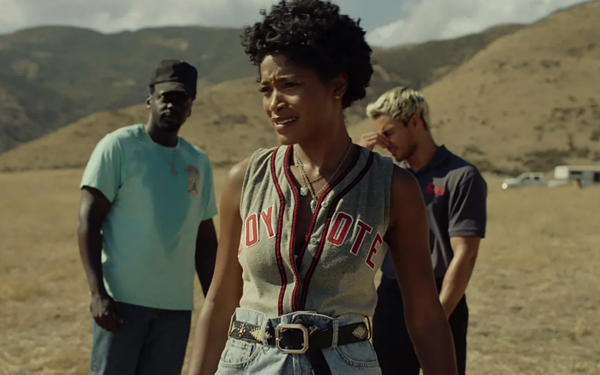
Jordan Peele’s third film comes with a lot of expectation behind it. Peele’s directorial debut, Get Out, was a smash hit that has solidified its position in the modern horror pantheon. His follow up, Us, was met with milder acclaim, that, while not diminishing its quality, has since faded from its honeymoon glow. For better or worse, his latest film, Nope, received the Cloverfield and M. Night Shyamalan advertising treatment, promising unparalleled mysteries and thrills that are all but impossible to live up to.
I’m happy to report that Peele manages to not meet those expectations, and in fact sidesteps them altogether with Nope, an Amblin Entertainment-style throwback to Spielbergian summer spectacles.
Nope is set in a secluded valley in Agua Dulce, California, where the descendants of the cowboy rider in Eadweard Muybridge’s famous photographic series “The Horse in Motion” own and operate a horse training ranch for horses in movies. After his father is killed by seemingly random falling debris, O.J. Haywood (Kaluuya) is left to run the family business with his energetic but disinterested sister Emerald (Palmer). Steven Yeun plays former child star Ricky “Jupe” Park, who now runs a Western theme park called Jupiter’s Claim. Jupe’s involvement is limited to small dealings with O.J., but he is given the biggest backstory in the film.
Nope is told in short chapters, one of which deals with a traumatic and intense episode during Jupe’s childhood starring in a ’90s sitcom. It may seem incongruous, but it ties in directly with the themes of the film, and provides one of the movie’s most haunting scenes.
Jordan Peele pulls together many themes and ideas in Nope, but whether you pick up on how the Haywood’ legacy in Hollywood is symbolic, or how advancement in camera technology connects to what we watch and how we watch it, or the themes of man’s place in nature, an exciting and enjoyable spectacle is still there to behold.
Peele’s writing and directing are sharp as ever, and cinematographer Hoyte Van Hoytema’s lens beautifully frames the desert landscape at magic hour, or O.J. racing on his horse mirroring his great-great-(great?)-grandfather’s legacy. Everyone is excellent in Nope, but it’s Keke Palmer as Emerald who is the buoyant soul of the film, the perfect foil to Kaluuya’s down-to-earth O.J. Her and her brother’s investigation into the oddity in the sky, the mystery in the clouds (I’ll say no more), is a delightful journey.
Whereas Get Out was an intense thriller with moments of tension-relieving levity, and Us was a downright scary semi-slasher, Nope is a lighter affair: a joyous adventure. There are plenty of intense and even terrifying moments, but the overall feel of Nope recalls the thrilling spectacles of the late 20th. That there’s so much more to mine from Nope is a bonus, but at this point it is to be expected from Jordan Peele.













